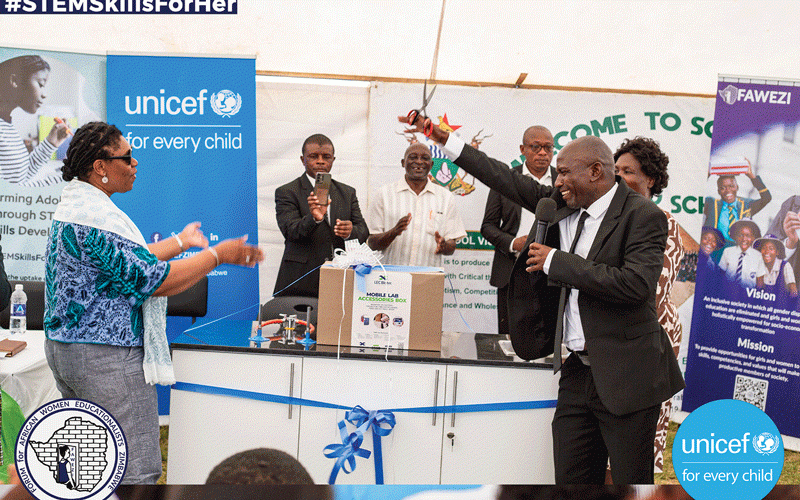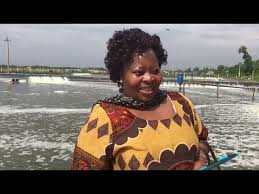
THE United Nations International Children’s Fund (Unicef) and the Forum for African Women Educationalists in Zimbabwe (Fawezi), have partnered the Primary and Secondary Education ministry (MoPSE in roling out a mobile laboratory initiative that is expected to benefit more than 4 000 adolescent girls, 350 teachers and 3 500 community members across Epworth and Hopley.
The move is seen as a significant step towards promoting science, technology, engineering and mathematics (STEM) education among adolescent girls.
Thirty-four mobile science laboratories were handed over to 15 primary and 19 secondary schools on March 14 at Southlea Park Primary School.
Some of the primary schools recipients in Hopley include Blackfordby, Derbyshire and Crest Breeders, while secondary schools include Southlea Park, Simbaredenga and Southlands Academy, among others.
In Epworth, the recipient schools comprise Domboramwari, Epworth and Muguta high schools, as well as Domboramwari, Makomo, Chizungu and Epworth primary schools, to mention but a few.
The initiative is part of the “Transforming Adolescent Girls’ Opportunities (Tago) through STEM Skills Project”, aimed at bridging the gender gap in STEM education, which is funded through the Canadian National Committee for Unicef (Canadian NatCom).
Officials said the assets would benefit all the students, including boys, by enhancing an overall STEM learning environment.
The Tago through STEM Skills Project aims to address key barriers limiting girls’ participation in STEM.
- Accident, piracy affected my career: Zembe
- NGO sets project to tackle child marriages
- News in depth: Zimbabweans choke under weight of worsening service delivery failures
- Accident, piracy affected my career: Zembe
Keep Reading
Over the past year, the project has implemented a series of activities, including training female STEM teachers in gender-responsive teaching methodologies, hosting STEM fairs and role-modelling sessions to inspire girls, conducting community outreach programmes to promote STEM education for girls, and strengthening child protection and guidance services within schools.
“Fawezi is committed to ensuring that all learners, especially girls, have access to quality STEM education. Our baseline survey highlighted a critical gap in STEM learning resources, which hindered girls’ participation in science-related fields,” said Lydia Madyirapanze, Fawezi executive director.
“Through the support of Unicef, 34 schools now have mobile science laboratories, providing practical learning opportunities that will help girls to stay in school, complete their education and contribute meaningfully to society.
“This initiative also benefits boys, promoting a stronger STEM learning culture for all. We thank MoPSE and Unicef for their partnership in advancing STEM education in Zimbabwe.”
Added Madyirapanze: “Epworth and Hopley are home to ambitious young minds, yet many schools lack the facilities necessary to provide practical science education. Without hands-on learning experiences, students — especially girls — often find STEM subjects intimidating or irrelevant to their future careers,’ read part of a statement released last week.
“The mobile laboratories will provide hands-on learning opportunities, enabling students to develop critical thinking, problem-solving and innovation skills essential for success in STEM fields.
“The initiative aligns with Zimbabwe’s National Development Strategy 1 and the Heritage-Based Curriculum, which emphasise increased STEM uptake and gender inclusivity in education.”
Jotham Mupunza, the Harare provincial education director in the Primary and Secondary Education ministry, emphasised that the laboratories will transform the learning experience of students.
“Through hands-on experiments and exposure to real-world application of science, girls will gain the confidence and skills necessary to envision themselves as scientists, engineers and innovators,” he said.
“By investing in their education, we are ensuring that they can compete on equal footing with their peers nationwide.”
By providing mobile laboratories, the project ensures that girls in underserved communities have equal opportunities to engage in practical science education, equipping them with skills for future careers in STEM.
“The provision of mobile science laboratories is a game-changer for schools in peri-urban areas where resources for practical STEM education are limited,” said Joëlle Ayité, Unicef chief of education.
“Girls are equally capable of excelling in science and technology, and these labs will provide the tools they need to explore, innovate and thrive.”











